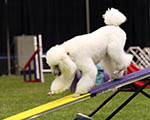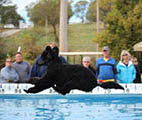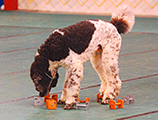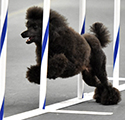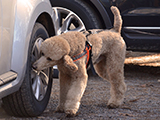Buying a Poodle
The Poodle is one of the most popular breeds of dogs in America. Poodles are highly intelligent, adaptable and have a remarkable sense of humor. They come in three sizes, many colors, don’t shed and are tolerated by many allergy sufferers. With so many wonderful qualities, it is easy to understand why the Poodle has so many admirers.
According to breed scholars, the Poodle’s origin is most likely Germany, where it was known as PUDELIN (meaning “to splash”) because of its love of water. It was the French, however, who honored the dog – at home, in court circles and on the battlefield, thus earning the dog the popular but incorrect title “French Poodle.”
THE TOY POODLE
Of the three varieties, the Toy is the smallest. It is popular with apartment owners, retired people who enjoy traveling with their pet, and those who prefer a very small dog. According to the “Breed Standard,” the Toy Poodle should not be taller than 10 inches at the shoulder.
THE MINIATURE POODLE
The Miniature Poodle is the medium size variety. Ideally falling between 10 and 15 inches at the shoulder, this sturdy size is small enough to suit apartment living and large enough to be a rough and tumble child’s companion.
THE STANDARD POODLE
The Standard Poodle has no height restriction although most are usually between 21 and 27 inches at the shoulder, with females leaning toward the lower end of the range. The Standard, originally a water retriever, is now enjoying a myriad of roles including hospital therapy dog, hunting dog and loyal companion. He is ideal for those individuals who prefer a larger dog.
DON’T BUY ON IMPULSE
Buying a dog should not be done on impulse. Learn as much as you can about the breed in which you are interested. Every breed has advantages and disadvantages.
Advantages of Owning a Poodle:
- Three sizes from which to choose.
- Highly intelligent and adaptable.
- Delightful, clever temperament.
- People oriented.
- Non-shedding.
- Breed of choice for many allergy sufferers.
- Many colors from which to choose.
Disadvantages of Owning a Poodle:
- Requires grooming on a regular basis.
- Does not do well when left alone for long periods of time.
- The Toy variety can be fragile and may not be suitable in homes with very young children.
HEALTH CONSIDERATIONS
There are hereditary health problems in all breeds of dogs. Below are some of the more common hereditary health problems in each variety of Poodle.
The following genetic disorders have been diagnosed in all three Poodle varieties: hip dysplasia, progressive retinal atrophy (PRA) and cataracts (leading to potential blindness), epilepsy (seizures), and autoimmune diseases.
The Toy and Miniature Poodle may also have loose stifles (knee caps) and Legg-Calve-Perthes disease (a disease of the hip joint), diabetes, Cushing’s disease, and early tooth loss.
The Standard Poodle may be subject to torsion/bloat, sebaceous adenitis (a skin disorder), and autoimmune problems such as Addison’s disease and thyroid disease.
A written report should be furnished upon request to the puppy buyer with the results of applicable testing on the sire and dam of the puppy, appropriate for the variety of Poodle.
Responsible, conscientious breeders screen all breeding stock for hereditary health problems for which we have testing available prior to utilizing any dog in a breeding program. They are delighted to answer any questions about the health of the puppy’s sire and dam.
However, even when the sire and dam have been tested and found free of specific hereditary health problems, there is no absolute guarantee that the puppy will not develop one of these problems or some other health problem. Buying a puppy from a breeder who tests breeding stock considerably increases your chances of getting a healthy puppy, but there are no absolute guarantees unless a DNA test is available.
SHOW QUALITY VERSUS PET QUALITY
A show quality puppy is one which, in the breeder’s opinion, should be able to become a champion. A pet quality puppy is less likely, in the breeder’s estimation, to become a champion. However, when buying a puppy (7 weeks to 16 weeks), trying to guess what that puppy will look like when it is an adult is just that—an educated guess, although good show breeders should be able to have some idea.
Most pet puppies are sold on the AKC’s limited registration form and with a spay/neuter contract. The limited registration form is a simple way of saying that although your pet is an AKC registered purebred dog, it cannot be bred and, if it is bred, the offspring cannot be registered with the American Kennel Club. Using this form is the breeder’s way of ensuring that their puppies will not be bred indiscriminately and without the proper health testing.
GUARANTEES/CONTRACTS
What should you expect in writing from the breeder?
- The AKC registration slip or the United Kennel Club registration slip in the United States, the Canadian Kennel Club registration slip in Canada, or the kennel club for the country of birth if different from that of your country.
- At least a three-generation pedigree.
- Copies of the results of health testing done on the sire and dam.
- Copies of applicable testing done on the puppy.
- A printed contract including a health guarantee.
- Vaccination and worming schedule–when given and when due–and what products were used.
- A time frame (2 days to a week) to determine if the puppy will fit the buyer’s household.
- A time period for the buyer to secure a veterinary check (24-48 hours).
- A statement of the breeder’s refund/return policy.
- Feeding instructions and enough food for the first few days in the new home.
Many breeders provide pictures of the sire and dam, photos of the entire litter, and puppy manuals which give housebreaking hints, training advice and information on health. These are an added bonus but are not absolutely necessary.
SHIPPING THE PUPPY
Many puppies are shipped safely by air to their new homes. The puppy buyer is responsible for the cost of the airfare, health certificate and shipping crate. Many breeders may ship the puppy in a “loaner crate” which the buyer must UPS back to the breeder ASAP. If the buyer chooses to return the puppy for any reason, the cost of the return airfare is the responsibility of the buyer. Airline regulations will determine if weather conditions preclude shipping.
RECOMMENDED READING
The Complete Poodle by Del Dahl
Crate Games (and other books and DVDs) by Susan Garrett
Don’t Shoot the Dog by Karen Pryor
Good Owners, Great Dog by Brian Kilcommons and Sarah Wilson
How to Raise a Puppy You Can Live With by Clarice Rutherford and David H. Neil
The Other End of the Leash by Patricia McConnell, Ph.D.
Poodle Clipping and Grooming: The International Reference by Shirlee Kalstone
VIP Poodle Activity Manual
For additional information to help you make the right choice in choosing a Poodle, see the following VIP educational materials:
- Don’t Be the Victim of an Unethical Breeder
- How to Evaluate a Breeder
- How to Evaluate the Website of a Breeder
- Questions to Ask a Breeder: Guidelines for Buying a Miniature, Standard or Toy Poodle
- VIP Recommended Genetic and Health Tests for Miniature, Standard or Toy Poodles
The information contained in these documents is current at the time of this writing and is accurate to the best of VIP’s knowledge.
This information has been provided to you at no charge. You are free to use it provided it is used in its entirety with no changes or alterations and that the copyright remains intact. If you have found this information to be helpful, please consider making a tax-deductible donation to:
Versatility in Poodles
4061 Highlands Rd
Franklin, NC 28734
To make a donation via PayPal, please click the Donate Button:
![]()
The contents of the www.vipoodle.org website, such as text, graphics, images, and other material contained on this site (“Content”) are for informational purposes only. The Content is not intended to be a substitute for professional veterinarian advice, diagnosis, or treatment. Always seek the advice of your veterinarian with any questions you may have regarding the medical condition of your pet. Never disregard professional advice or delay in seeking it because of something you have read on this website!
If you think your pet has a medical emergency, call or visit your veterinarian or your local veterinary emergency hospital immediately. Versatility in Poodles and www.vipoodle.org do not recommend or endorse any specific veterinarians, products, procedures, opinions, or other information that may be mentioned on this website. Reliance on any information appearing on this website is entirely at your own risk.



